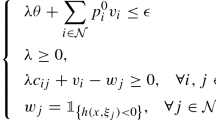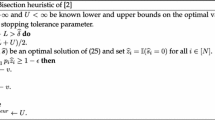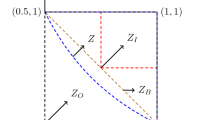Abstract
We consider exact deterministic mixed-integer programming (MIP) reformulations of distributionally robust chance-constrained programs (DR-CCP) with random right-hand sides over Wasserstein ambiguity sets. The existing MIP formulations are known to have weak continuous relaxation bounds, and, consequently, for hard instances with small radius, or with large problem sizes, the branch-and-bound based solution processes suffer from large optimality gaps even after hours of computation time. This significantly hinders the practical application of the DR-CCP paradigm. Motivated by these challenges, we conduct a polyhedral study to strengthen these formulations. We reveal several hidden connections between DR-CCP and its nominal counterpart (the sample average approximation), mixing sets, and robust 0–1 programming. By exploiting these connections in combination, we provide an improved formulation and two classes of valid inequalities for DR-CCP. We test the impact of our results on a stochastic transportation problem numerically. Our experiments demonstrate the effectiveness of our approach; in particular our improved formulation and proposed valid inequalities reduce the overall solution times remarkably. Moreover, this allows us to significantly scale up the problem sizes that can be handled in such DR-CCP formulations by reducing the solution times from hours to seconds.
Similar content being viewed by others
References
Abdi, A., Fukasawa, R.: On the mixing set with a knapsack constraint. Math. Program. 157, 191–217 (2016)
Atamtürk, A.: Strong formulations of robust mixed 0–1 programming. Math. Program. 108, 235–250 (2006)
Atamtürk, A., Nemhauser, G.L., Savelsbergh, M.W.: The mixed vertex packing problem. Math. Program. 89(1), 35–53 (2000)
Blanchet, J., Murthy, K.: Quantifying distributional model risk via optimal transport. Math. Oper. Res. 44(2), 565–600 (2019). https://doi.org/10.1287/moor.2018.0936
Calafiore, G., Campi, M.: Uncertain convex programs: randomized solutions and confidence levels. Math. Program. 102, 25–46 (2005)
Calafiore, G., El Ghaoui, L.: On distributionally robust chance-constrained linear programs. J. Optim. Theory Appl. 130, 1–22 (2006)
Campi, M., Garatti, S.: A sampling-and-discarding approach to chance-constrained optimization: feasibility and optimality. J. Optim. Theory Appl. 148, 257–280 (2011)
Chen, Z., Kuhn, D., Wiesemann, W.: Data-Driven Chance Constrained Programs Over Wasserstein Balls (2018). arXiv:1809.00210
El Ghaoui, L., Oks, M., Oustry, F.: Worst-case value-at-risk and robust portfolio optimization: a conic programming approach. Oper. Res. 51(4), 543–556 (2003)
Gao, R., Kleywegt, A.J.: Distributionally Robust Stochastic Optimization with Wasserstein Distance (2016). arXiv:1604.02199
Günlük, O., Pochet, Y.: Mixing mixed-integer inequalities. Math. Program. 90(3), 429–457 (2001)
Hanasusanto, G.A., Roitch, V., Kuhn, D., Wiesemann, W.: A distributionally robust perspective on uncertainty quantification and chance constrained programming. Math. Program. 151(1), 35–62 (2015)
Hota, A.R., Cherukuri, A., Lygeros, J.: Data-driven chance constrained optimization under Wasserstein ambiguity sets. In: 2019 American Control Conference (ACC), pp. 1501–1506, July (2019). https://doi.org/10.23919/ACC.2019.8814677
Ji, R., and Lejeune, M.: Data-driven distributionally robust chance-constrained optimization with Wasserstein metric. Technical Report April 2019. http://www.optimization-online.org/DB_HTML/2018/07/6697.html
Jiang, R., Guan, Y.: Data-driven chance constrained stochastic program. Math. Program. 158, 291–327 (2016)
Kılınç-Karzan, F., Küçükyavuz, S., Lee, D.: Joint chance-constrained programs and the intersection of mixing sets through a submodularity lens (2019). arXiv:1910.01353
Küçükyavuz, S.: On mixing sets arising in chance-constrained programming. Math. Program. 132(1–2), 31–56 (2012)
Küçükyavuz, S., Noyan, N.: Cut generation for optimization problems with multivariate risk constraints. Math. Program. 159(1–2), 165–199 (2016)
Li, B., Jiang, R., Mathieu, J.L.: Ambiguous risk constraints with moment and unimodality information. Math. Program. 173(1), 151–192 (2019)
Liu, X., Küçükyavuz, S., Luedtke, J.: Decomposition algorithms for two-stage chance-constrained programs. Math. Program. 157(1), 219–243 (2016)
Liu, X., Küçükyavuz, S., Noyan, N.: Robust multicriteria risk-averse stochastic programming models. Ann. Oper. Res. 259(1), 259–294 (2017)
Liu, X., Kılınç-Karzan, F., Küçükyavuz, S.: On intersection of two mixing sets with applications to joint chance-constrained programs. Math. Program. 175, 29–68 (2019)
Luedtke, J.: A branch-and-cut decomposition algorithm for solving chance-constrained mathematical programs with finite support. Math. Program. 146, 219–244 (2014)
Luedtke, J., Ahmed, S.: A sample approximation approach for optimization with probabilistic constraints. SIAM J. Optim. 19, 674–699 (2008)
Luedtke, J., Ahmed, S., Nemhauser, G.L.: An integer programming approach for linear programs with probabilistic constraints. Math. Program. 122(2), 247–272 (2010)
Meraklı, M., Küçükyavuz, S.: Risk aversion to parameter uncertainty in Markov decision processes with an application to slow-onset disaster relief. IISE Trans. 52, 1–21 (2019). https://doi.org/10.1080/24725854.2019.1674464. (Article in advance)
Mohajerin Esfahani, P., Kuhn, D.: Data-driven distributionally robust optimization using the wasserstein metric: performance guarantees and tractable reformulations. Math. Program. 171(1), 115–166 (2018). https://doi.org/10.1007/s10107-017-1172-1
Noyan, N.: Risk-averse stochastic modeling and optimization. In: TutORials in Operations Research: Recent Advances in Optimization and Modeling of Contemporary Problems, Chapter 10, pp. 221–254. INFORMS, 2018. https://doi.org/10.1287/educ.2018.0183
Noyan, N., Meraklı, M., Küçükyavuz, S.: Two-stage stochastic programming under multivariate risk constraints with an application to humanitarian relief network design. Math. Program. (2019). https://doi.org/10.1007/s10107-019-01373-4. (Article in advance)
Rahimian, H., Mehrotra, S.: Distributionally Robust Optimization: A Review (2019). arXiv:1908.05659
Ruszczyński, A.: Probabilistic programming with discrete distributions and precedence constrained knapsack polyhedra. Math. Program. 93, 195–215 (2002)
Xie, W.: On distributionally robust chance constrained programs with Wasserstein distance. Math. Program. (2019). https://doi.org/10.1007/s10107-019-01445-5. (Article in advance)
Xie, W., Ahmed, S.: On deterministic reformulations of distributionally robust joint chance constrained optimization problems. SIAM J. Optim. 28(2), 1151–1182 (2018a)
Xie, W., Ahmed, S.: On quantile cuts and their closure for chance constrained optimization problems. Math. Program. 172, 621–646 (2018b)
Zhao, M., Huang, K., Zeng, B.: A polyhedral study on chance constrained program with random right-hand side. Math. Program. 166, 19–64 (2017)
Acknowledgements
This paper is in memory of Shabbir Ahmed, whose fundamental contributions on mixing sets, chance-constrained programming and distributionally robust optimization we build upon. We thank the two referees and the AE for their suggestions that improved the exposition. This research is supported, in part, by ONR Grant N00014-19-1-2321, by the Institute for Basic Science (IBS-R029-C1), Award N660011824020 from the DARPA Lagrange Program and NSF Award 1740707.
Author information
Authors and Affiliations
Corresponding author
Additional information
Publisher's Note
Springer Nature remains neutral with regard to jurisdictional claims in published maps and institutional affiliations.
Supplementary Numerical Results
Supplementary Numerical Results
In Table 5 we report the performance of the basic formulation (5) when combined with mixing (16) and path inequalities (21) for \(F=5\), \(D=50\), \(\epsilon =0.1\). These results highlight that mixing and path inequalities are indeed useful when applied to the basic formulation, without all the other enhancements we propose.
We see that for \(N=100\), Basic+Mixing+Path solves all instances (and with slightly quicker times on average) whereas Basic in Table 1 does not manage to solve any instances for \(\theta _1\). For \(N=1000\), we again see an improvement in the number of instances solved when using the inequalities, but for larger \(\theta _8,\theta _9,\theta _{10}\), times are slightly slower. We believe this is due to the extra time required to solve the larger LP relaxations as a result of adding cuts. For \(N=3000\), we now see that Basic+Mixing+Path is unable to find a feasible integer solution within 1 h for a larger number of instances than Basic (we again believe this is due to larger LP relaxations), but whenever it does, it often solves to optimality, which Basic never does.
In contrast to Improved, there are more cuts generated for Basic for all \(\theta \) values. Nevertheless, as expected, the performance achieved by Basic+Mixing+Path is still worse than the performance of our improved formulation (20), with or without inequalities.
Rights and permissions
About this article
Cite this article
Ho-Nguyen, N., Kılınç-Karzan, F., Küçükyavuz, S. et al. Distributionally robust chance-constrained programs with right-hand side uncertainty under Wasserstein ambiguity. Math. Program. 196, 641–672 (2022). https://doi.org/10.1007/s10107-020-01605-y
Received:
Accepted:
Published:
Issue Date:
DOI: https://doi.org/10.1007/s10107-020-01605-y




